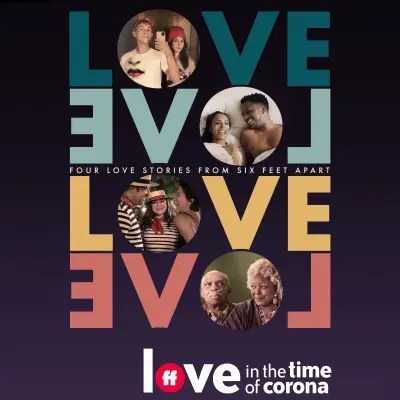Freeform's Love in the Time of Corona feels airless and contrived, even for the romcom genre
-

"The ongoing pandemic has been framed by some industry Pollyannas as the ultimate creative challenge, but Covid-themed, quarantine-constrained TV has yet to overcome the conditions in which it’s made," says Inkoo Kang. "So it is with Freeform’s Love in the Time of Corona, a Love, Actually-style ensemble rom-com that’s mercifully better-looking than most other Zoom-heavy episodes that have been shot post-lockdown. That’s not necessarily an endorsement; it's a showcase of cornpone writing, wildly uneven acting and voyeuristic glimpses of performers’ houses. (The cast, made up of real-life couples, families and roommates, were filmed in their own homes, which have been turned into antiseptic sets.) The four-part series, which airs over two consecutive nights, is a testament to the cast and crew’s resourcefulness, but rarely transcends its stock scenarios or PSA vibe." Kang adds: "Love in the Time of Corona ultimately manages to rouse with its grand romantic gestures, but too much of the preceding material feels unimaginative, expository and dramatically DOA. At a time of such terrifying uncertainty, we deserve much better escapism."
ALSO:
- Love in the Time of Corona more closely resembles an acting school challenge: "Love in the Time of Corona was made hastily and experimentally, with evidence that the participants were game for what seems like an acting school challenge, a way to pass the time and turn TikTok dances and references into, supposedly, reflective art," says Adrian Horton. "But aside from issues of quality (and there are many, from a less than half-baked script to workshop-style acting to awkward but perhaps unavoidable reliance on FaceTime calls, which, depending on your TV taste, matters a lot or doesn’t at all), watching Love in the Time of Corona raises the question: what do we want out of quick-response TV? What’s the point – can there be one? – of applying the conventions of episodic narrative to a quarantine that we’re still half in, or of reflecting a time no one can possibly have processed?...Mostly, the show reads as an attempt to make some meaningful, coherent and hopeful character study with a 'relatable' backdrop it haphazardly references. There’s something to be said for people’s earnest attempt to make something out of a time when all productions ground to a halt. But the finished product doesn’t seem so much like creative resilience, a TV screw-you to corona, as a rough draft rehash of the too recently familiar, a hazy, messy and devastating time that can’t yet be whipped up into anything coherent."
- It’s easy to be touched by the emotion of it all—but even easier to be exasperated by its naiveté: "That everyone involved in Love in the Time of Corona turned around a series this professional-looking in the amount of time they did is remarkable; it was shot using state-of-the-art remote technology in the actors’ own homes, with production only launching less than two months ago," says Kevin Fallon. "But it’s hard to create anything about that time without being both too soon and too late. It’s inherently unpleasant to relive those circumstances, no matter how uplifting or touching the series can be. And it glares with a lack of nuance gleaned from the months of processing and the even more extreme experiences we’ve endured since."
- Love in the Time of Corona is a feel-good antidote to quarantine blues: "As it turns out, the series isn't so much an unpleasant reminder of all that we've lost, but a hopeful expression of how we've managed to overcome those struggles," says Lindsay MacDonald. "Through the eyes of various couples self-isolating in Los Angeles, this four-part miniseries explores how difficult it is to connect with people when you're cut off from the world...The true magic of the series, however, is the ability of the audience to instantly identify with many, if not all of the characters. At first, all of these couples approach the outbreak and their resulting isolation the same way we all probably did — as a temporary inconvenience that would surely be over by May. The slowly creeping realization that this situation is not just serious but also long-term is handled differently by all of them in ways that feel appropriately flawed and honest."
- Stars Leslie Odom Jr. and Nicolette Robinson and creator Joanna Johnson detail the logistics involved in making Love in the Time of Corona: Johnson waited until casting was complete with actors who were quarantining together before starting the writing process.
- Johnson didn't want to do a "Zoom show": “We didn’t want to do a Zoom show, even though we appreciate the shows and the reunion shows that people did do just purely over Zoom,” says Johnson. “We wanted to do a real production and figure out a way to do it… I really wanted to see people interacting with each other in person during this time.”
TOPICS: Love in the Time of Corona, Freeform, Joanna Johnson, Leslie Odom Jr., Nicolette Robinson, Coronavirus
More Love in the Time of Corona on Primetimer:
